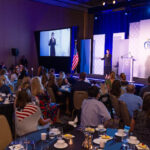Leave it to the New York Times – the nation’s self-proclaimed “Newspaper of Record,” to compose a description of how government employee unions fleece unwitting and unwilling “members” in such tortured language you could almost come away thinking it’s the poor union getting the shaft rather than the workers.
I said almost.
In an Aug. 5 editorial offering the Times’ loony leftist take on major cases the U.S. Supreme Court will consider during the 2015-16 session, the authors begin their trashing of Friedrichs v. California Teachers Association with the disclaimer:
“For decades, public-sector unions have been allowed to charge non-members for the costs of collective bargaining on their behalf, but not fees for the unions’ political and lobbying activity, which are paid only by members.”
Come again? The union is “allowed” to charge non-members? And this, the editorial blithely assures us, “strikes a reasonable balance.”
Reasonable to whom?
For starters, nowhere in the editorial do the authors address the question of who gets to decide what percentage of a union’s budget is spent on collective bargaining versus political contributions. In point of fact, we’re forced to rely on the dubious accounting of the unions themselves.
Consequently, it’s not unusual to see workers who’ve opted out still forking over monthly fees that amount to about 90 percent of full-member dues. Which means we’re expected to believe lobbying and political contributions only add up to 10 percent of a union’s total expenditures.
But given the millions we know unions funnel to liberal candidates and causes (and the millions more they apparently don’t report), it beggars belief to suggest it costs nine times as much just to sit at a bargaining table.
The editorial authors are also woefully short on details as to how this whole opting out process works. In the real world, for example, one isn’t considered a member of an organization they haven’t at least asked to join. But in the bizarro world of Leftist politics, you’re in until you ask out.
To the New York Times editorial board, it makes perfect sense to assume every government worker is a de facto union member unless they’ve filled out a mountain of paperwork, withstood a barrage of union intimidation and requested their freedom within a prescribed window of opportunity – such as during the hours of a solar eclipse.
But even more fundamentally, what exactly entitles the union to cut itself in for a share of a non-member’s wages based on the assumption the worker would have been paid less absent the intervention of the union? According to the editorial:
“…non-members (shouldn’t be permitted to) benefit from the higher wages and better working conditions achieved through collective bargaining without paying their fair share.”
But again, why do we simply assume a non-represented worker couldn’t possibly have gotten the same deal on his or her own – you know, like non-union workers in the private sector do every day? At the Freedom Foundation, we believe we’ve helped influence any number of positive laws over the years that make measurably life better for people in Washington. Does that mean we can forcibly deduct money from the paychecks of everyone we say benefits from these laws to fund even more of our agenda?
Of course not. Again, in the real world, taking something without permission is stealing.
And that doesn’t change just because you – and, apparently the New York Times – have decided you deserve it.










